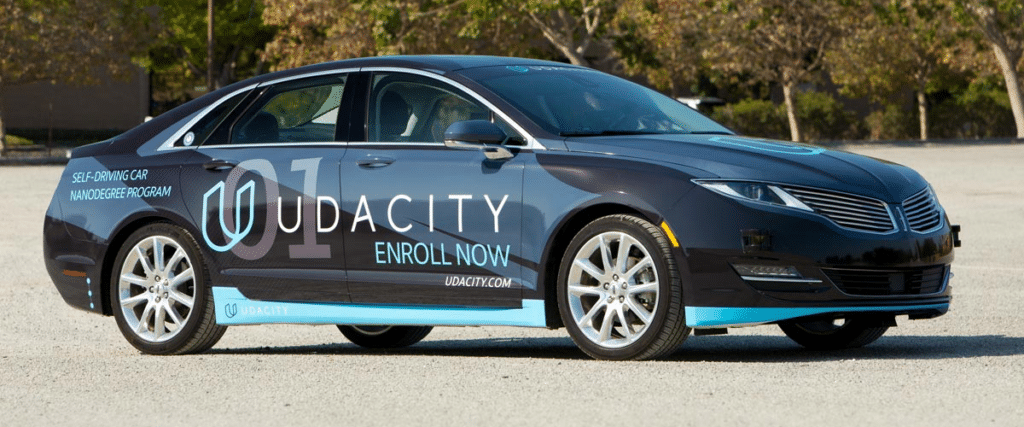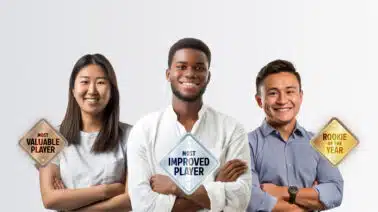
Intersect 2017 is now behind us, but we’re still buzzing with excitement! It was such an incredible meeting of so many minds, and a living testament to the power of community. With the theme of Learning for the Jobs of Today, Tomorrow, and Beyond to rally around, you could just feel new opportunities emerging, and great connections were being made everywhere you looked.
It is with this theme front-of-mind that we’ve recently been featuring stories about Udacity students getting jobs—specifically, our Self-Driving Car program students, because in many ways, their stories are emblematic of the fact that the jobs of tomorrow are already becoming the jobs of today.
 I was recently introduced to the story of Patrick Kern, a Business Computing master student at the HTW Berlin, who is also working part time as a software engineer at Signavio. Patrick is currently enrolled in Udacity’s Self-Driving Car Engineer Nanodegree program, and is both a student, and a mentor supporting his fellow learners. His story is a wonderful example of exactly the kind of community power we mention above.
I was recently introduced to the story of Patrick Kern, a Business Computing master student at the HTW Berlin, who is also working part time as a software engineer at Signavio. Patrick is currently enrolled in Udacity’s Self-Driving Car Engineer Nanodegree program, and is both a student, and a mentor supporting his fellow learners. His story is a wonderful example of exactly the kind of community power we mention above.
About a month after joining the Self-Driving Car program, a fellow student asked him if he’d be interested in forming a meetup group about “Self-Driving Cars & Autonomous Mobility.” He was definitely interested, and not only has the group since swelled to over 140 members, but it has led directly to a new opportunity for Patrick! In April he will start writing his master thesis in cooperation with Hella Ventures, the incubator for The HELLA Group, which is one of the top 40 automotive parts suppliers in the world, and one of the 100 largest German industrial companies.
We were so excited by Patrick’s success, and very eager to learn more about the work he’s doing, and what he sees ahead for this incredible field. He very graciously agreed to provide responses to our questions:
Patrick, as someone already working so hard in the field, and already taking advantage of some remarkable opportunities, what can you tell us about what the future holds for others looking to follow a similar path?
In his book “So Good They Can’t Ignore You”, Cal Newport describes his opinion on finding a fulfilling job by most importantly collecting so-called “career capital” in an area allowing you to distinguish yourself from your competition. As I see it, the radical changes happening in the car industry yield plenty of options to do so. And that is just the beginning. More and more industries will change drastically, challenged by the skyrocketing progress in fields like AI, Robotics, Genetics, and Nanoscience. In my opinion, being able to work in one of those areas will not only secure career opportunities, but it will also allow people to directly shape the future we will live in.
Can you speak to your sense of how the kinds of skills you’re learning now will inform future career successes for yourself and your peers in the program?
As technology progresses faster than ever before, universities with their current way of teaching will fail to deliver the relevant knowledge at the right time, quantity and quality. So I believe that if your goal is to enter a young and innovative field like autonomous mobility, a specialized program like Udacity’s Self-Driving Car program is a valuable resource for shaping your profile. Especially since the skills taught are based on the current and future demand of leading companies which even help to create the materials. As I see it, there is no better way of obtaining skills that companies want to hire you for.
It’s clear you’re very passionate about the extent to which transformative technologies like AI, Deep Learning, and Autonomous Vehicle Technology will impact the future of work; do you see the impact being felt elsewhere as well?
That’s a really tough question as I believe the complete extent of the impact is almost impossible to predict. For me, it’s not only about how these technologies will change the future of work, but also, about the change of the whole society. To get a sense of what might happen I read a lot of articles, interviews and talks from influential people in relevant fields like Elon Musk, Ray Kurzweil or Demis Hassabis. It seems to be clear that manual and repetitive work will almost completely be automated in the future. It’s just the timeframe which people don’t seem to be able to agree upon. This development will have a serious impact on many people and their existences if we won’t come up with a solution. That’s why companies like Y Combinator started to do active research on topics like basic income. In such a rapidly changing future, probably the most essential skill will be the ability to learn and adapt to new challenges. We might actually be just a couple of years away from the greatest change to society in human history.
Any advice for someone who’s trying to decide whether a path like this is right for them?
Just try it. You can think about it day and night, but you will never know unless you give it a shot. We’re living in great times where it got incredibly easy to collect knowledge with the help of the internet and the growth of MOOC platforms. A lot of these resources can even be accessed for free. Just keep in mind that watching people do something won’t make you an expert. You will have to get your hands dirty. So what I would recommend is to look for some kind of project like a program or app you would like to have, a Kaggle contest or even building an autonomous RC car. Then start learning about the topic through online courses, tutorials, books or other resources and directly apply your newly gained knowledge. That, in fact, is very similar to how Udacity’s Nanodegree programs work, and if you have the option to enroll in one, it’s definitely something worth trying.
Patrick, thank you so much! Your excitement and passion are so inspiring! We congratulate you on your successes so far, and can’t wait to hear more, especially after you start your thesis work in April.



